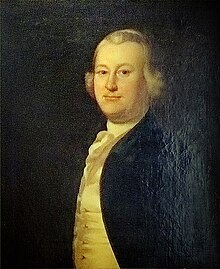James Otis, Jr.
| James Otis Jr. | |
|---|---|

Portrait by Joseph Blackburn, 1755
|
|
| Born |
February 5, 1725 Barnstable, Province of Massachusetts Bay, British America |
| Died | May 23, 1783 (aged 58) Andover, Massachusetts, U.S. |
| Resting place | Granary Burying Ground, Boston |
| Occupation | lawyer, political activist, pamphleteer and legislator |
| Known for |
Oration against British writs of assistance February 5, 1761 which catapulted him into the first ranks of Patriot leaders. The executive Courts must pass such acts into disuse." "A man's house is his castle.... this writ [of assistance] would totally annihilate this privilege. Custom-house officers may enter our houses when they please." |
| Spouse(s) | Ruth Cunningham |
| Children | James, Elizabeth Brown Mary Lincoln |
| Parent(s) |
James Otis Sr. Mary Allyne |
Oration against British writs of assistance February 5, 1761 which catapulted him into the first ranks of Patriot leaders. The executive Courts must pass such acts into disuse." "A man's house is his castle.... this writ [of assistance] would totally annihilate this privilege.
James Otis Jr. (February 5, 1725 – May 23, 1783) was a lawyer in colonial Massachusetts, a member of the Massachusetts provincial assembly, and an early advocate of the Patriot views against British policy that led to the American Revolution. His catchphrase "Taxation without representation is tyranny" became the basic Patriot position.
Otis was born in West Barnstable ("Great Marshes"), Massachusetts, the second of thirteen children and the first to survive infancy. His sister Mercy Otis Warren, his brother Joseph Otis, and his youngest brother Samuel Allyne Otis became leaders of the American Revolution, as did his nephew Harrison Gray Otis. His father Colonel James Otis Sr. was a prominent lawyer and militia officer.
In 1755, James married "the beautiful Ruth Cunningham", a merchant's daughter and heiress to a fortune worth ₤10,000. Their politics were quite different, yet they were attached to each other. Otis later "half-complained that she was a 'High Tory,'" yet in the same breath "she was a good Wife ['Ruthy'], and too good for him." The marriage produced children James, Elizabeth, and Mary. Their son James died at the age of eighteen. Their daughter Elizabeth was a Loyalist like her mother; she married Captain Brown of the British Army and lived in England for the rest of her life. Their youngest daughter Mary married Benjamin Lincoln, son of the distinguished Continental Army General Benjamin Lincoln.
Otis graduated from Harvard in 1743 and rose meteorically to the top of the Boston legal profession. In 1760, he received a prestigious appointment as Advocate General of the Admiralty Court. He promptly resigned, however, when Governor Francis Bernard failed to appoint his father to the promised position of Chief Justice of the province's highest court; the position instead went to longtime Otis opponent Thomas Hutchinson.
...
Wikipedia
